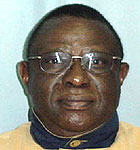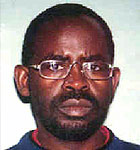
The International Criminal Tribunal for Rwanda was an international court established in November 1994 by the United Nations Security Council in Resolution 955 in order to judge people responsible for the Rwandan genocide and other serious violations of international law in Rwanda, or by Rwandan citizens in nearby states, between 1 January and 31 December 1994. The court eventually convicted 61 individuals and acquitted 14.

The Rwandan genocide occurred between 7 April and 15 July 1994 during the Rwandan Civil War. During this period of around 100 days, members of the Tutsi minority ethnic group, as well as some moderate Hutu and Twa, were killed by armed Hutu militias. The most widely accepted scholarly estimates are around 500,000 to 662,000 Tutsi deaths.

Théoneste Bagosora was a Rwandan military officer. He was chiefly known for his key role in the 1994 Rwandan genocide for which he was sentenced to life imprisonment by the International Criminal Tribunal for Rwanda (ICTR). In 2011, the sentence was reduced to 35 years' imprisonment on appeal. He was due to be imprisoned until he was 89. According to René Lemarchand, Bagosora was "the chief organizer of the killings". On 25 September 2021, he died in a prison hospital in Mali, where he was being treated for heart issues.
Augustin Bizimungu is a former general of the Rwandan Armed Forces (FAR). On 16 April 1994, at the start of the Rwandan genocide, he was appointed chief of staff of the army and promoted to the rank of major general.
Elizaphan Ntakirutimana was a pastor of the Seventh-day Adventist Church in Rwanda and was the first clergyman to be convicted for a role in the 1994 Rwandan genocide.

Pauline Nyiramasuhuko is a Rwandan politician who was the Minister for Family Welfare and the Advancement of Women. She was convicted of having incited troops and militia to carry out rape during the Rwandan genocide of 1994. She was tried for genocide and incitement to rape as part of the "Butare Group" at the International Criminal Tribunal for Rwanda (ICTR) in Arusha, Tanzania. In June 2011, she was convicted of seven charges and sentenced to life imprisonment. Nyiramasuhuko is the first woman to be convicted of genocide by the ICTR, and the first woman to be convicted of genocidal rape.
Protais Zigiranyirazo commonly known as Monsieur Zed, is a Rwandan businessman and politician and was governor of the Ruhengeri prefecture in northwestern Rwanda from 1974 to 1989. Zigiranyirazo was a member of the Akazu, an elite circle of relatives and friends of former President Juvénal Habyarimana who pushed the Hutu Power ideology.
Jean-Paul Akayesu is a former teacher, school inspector, and Republican Democratic Movement (MDR) politician from Rwanda, convicted of genocide for his role in inciting the Rwandan genocide.
Simon Bikindi was a Rwandan singer-songwriter who was formerly very popular in Rwanda. His patriotic songs were playlist staples on the national radio station Radio Rwanda during the war from October 1990 to July 1994 before the Rwandan Patriotic Front took power. For actions during the april 1994's genocide against Tutsi, he was tried and convicted for incitement to genocide by the International Criminal Tribunal for Rwanda (ICTR) in 2008. He died of diabetes at a Beninese hospital in late 2018.
Georges Henri Yvon Joseph Ruggiu is a Belgian radio presenter who worked for Rwandan radio station Radio Télévision Libre des Mille Collines, which played a significant role in promoting the genocide against the Tutsi. Like the station's other broadcasters, Ruggiu incited violence against Tutsi and moderate Hutu over the air. He had become involved in Rwandan politics just two years before the genocide.
Athanase Seromba is a Catholic priest from Rwanda who was found guilty of committing genocide and of crimes against humanity during the Rwandan genocide.
Félicien Kabuga is a génocidaire and Rwandan businessman who played a major role in the run-up to the Genocide of the Rwandan Tutsis. A multimillionaire, he was closely connected to dictator Juvénal Habyarimana's Hutu nationalist MRND party and the Akazu, an informal group of Hutu extremists who helped lead the Rwandan genocide.
Callixte Nzabonimana is a former Rwandan politician who is accused of participating in the Rwandan genocide.
Augustin Ndindiliyimana is a former Rwandan General and Chief of the Rwandan National Gendarmerie. He was convicted of genocide by the International Criminal Tribunal for Rwanda but he was acquitted by the tribunal upon appeal.

Jean-Bosco Barayagwiza was a convicted Génocidiare and politician associated with the Hutu Power movement. A high-ranking civil servant, Barayagwiza served as policy director within the Ministry of Foreign Affairs at the time of the Rwandan genocide. He has been described as one of the "masterminds" of the genocide.
Ferdinand Nahimana is a Rwandan historian, who was convicted of incitement to genocide for his role in the Rwandan genocide.

Patrick Karegeya was a head of intelligence in Rwanda. He was a member of the Rwandan Patriotic Front (RPF) group that took power in Rwanda following the genocide and civil war. After becoming a critic of RPF leader Paul Kagame, he was stripped of his rank and jailed. Following a time in exile, he was assassinated in Johannesburg, South Africa on December 31, 2013.
The following lists events that happened during 2009 in Rwanda.
The following lists events that happened during 2014 in Rwanda.





